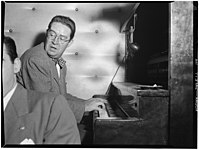Joe Sullivan, Date of Birth, Place of Birth, Date of Death
TweetJoe Sullivan
American musician
 Date of Birth: 04-Nov-1906
Date of Birth: 04-Nov-1906
 Place of Birth: Chicago, Illinois, United States
Place of Birth: Chicago, Illinois, United States
Date of Death: 13-Oct-1971
Profession: pianist, jazz musician
Nationality: United States
Zodiac Sign: Scorpio 
About Joe Sullivan
- Michael Joseph O'Sullivan (November 4, 1906 – October 13, 1971) was an American jazz pianist. Sullivan was the ninth child of Irish immigrant parents.
- He studied classical piano for 12 years and at age 17, he began to play popular music in silent-movie theaters, on radio stations, and then with the dance orchestras where he was exposed to jazz.
- He graduated from the Chicago Conservatory and was an important contributor to the Chicago jazz scene of the 1920s.
- Sullivan's recording career began towards the end of 1927 when he joined McKenzie and Condon's Chicagoans.
- Other musicians in his circle included Jimmy McPartland, Frank Teschemacher, Bud Freeman, Jim Lanigan and Gene Krupa.
- In 1933, he joined Bing Crosby as his accompanist, recording and making many radio broadcasts. He contracted tuberculosis in 1936 and while he was convalescing at a sanitarium in Monrovia in 1937, Crosby organized and appeared in a five-hour benefit for him at the Pan-Pacific Auditorium in Los Angeles on May 23, 1937 in front of an audience of six thousand.
- The show was broadcast over two different radio stations with fourteen bands attending (including those led by Woody Herman, Ray Noble, Jimmy Dorsey, Jimmy Grier, Louis Prima, Harry Owens, and Victor Young) and other performers included Connie Boswell, Johnny Mercer, Red Norvo, and Ella Logan.
- Approximately $3,000 was raised for Sullivan.After suffering for two years with tuberculosis, he briefly rejoined Bing Crosby in 1938 and the Bob Crosby Orchestra in 1939.
- In 1940, when leading Joe Sullivan's Cafe Society Orchestra, he had a minor hit with "I've Got a Crush on You".By the 1950s, Sullivan was largely forgotten, playing solo in San Francisco.
- Marital difficulties and excessive drinking caused Sullivan to become increasingly unreliable and unable to keep a steady job, either as band member or soloist. The British poet (and jazz pianist) Roy Fisher celebrated Sullivan's playing with a poem, "The Thing About Joe Sullivan", regarded by some critics as one of the best poems about jazz.
- Fisher also used that title for a book of his selected poems, because (he said) he felt Sullivan was a neglected master who deserved to have his name on the cover of a book.
Read more at Wikipedia
See Also
- Famous People's Birthdays on 04 November, United States
- Famous People's Birthdays in November, United States
- Famous pianist's Birthdays on 04 November, United States
- Famous pianist's Birthdays in November, United States
- Famous jazz musician's Birthdays on 04 November, United States
- Famous jazz musician's Birthdays in November, United States


